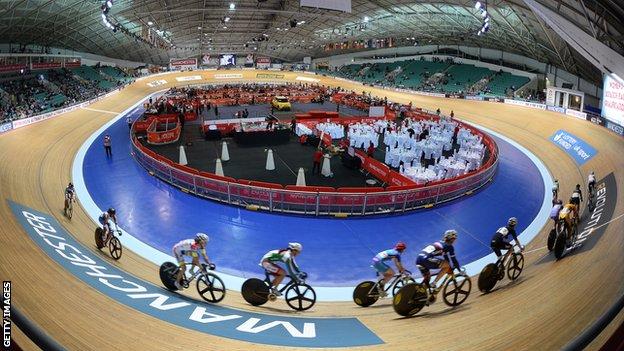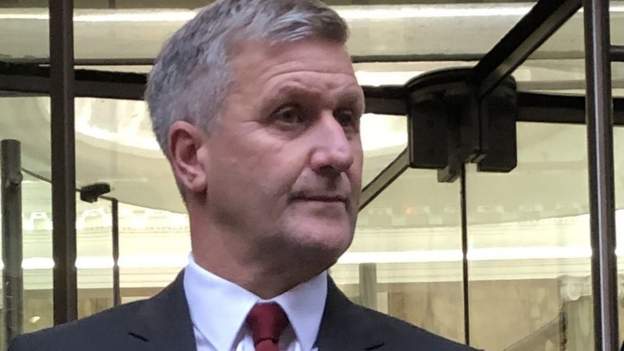British Cycling is facing scrutiny over a request its former chief doctor made to UK Anti-Doping to share athlete biological passport data a few months before the Rio Olympics.
In January 2016 Richard Freeman wrote about the proposal to several senior officials at the governing body.
In an email seen by the BBC, the ex-British Cycling doctor suggested asking riders for monthly test results “for statistical analysis similar to that performed by anti-doping agencies”.
“This is an opportunity to… give warning of targeted testing,” he wrote.
Freeman said it would allow “early detection in fluctuations of the riders’ ABP (athlete biological passport)” and give “time for riders to consider reasons as to why there are fluctuations and prepare a defence”.
An ABP is an electronic document about the athlete that contains certain biomarkers from throughout their career. If these markers change dramatically it alerts officials that the athlete might be doping.
The following month, the request for UK Anti-Doping (Ukad) to share riders’ data was discussed at a meeting of British Cycling’s ‘anti-doping commission’.
According to the minutes of the meeting, after “in-depth discussion”, Ukad – which was represented on the commission – was “unwilling” to share the information.
But the World Anti-Doping Agency (Wada) has now referred the matter to its independent investigations department.
It is already looking into Ukad’s handling of a case in 2011 when it allowed British Cycling to conduct private testing after a rider’s sample was found to contain traces of banned steroid nandrolone.
Freeman declined to comment.
British Cycling said the doctor’s proposal “was made with the intention of better supporting the work of anti-doping organisations”.
Last month a medical tribunal found Freeman guilty of ordering testosterone to the national velodrome in 2011, knowing or believing it was to help a rider to dope, and struck him off the medical register permanently.

The background
The athlete biological passport has become a key tool for anti-doping agencies over the last decade.
In January 2016 Freeman wrote to several members of the British Cycling hierarchy, including three current staff members; head coach Iain Dyer, programmes director Andy Harrison and para-cycling chief Jon Pett.
He wrote: “I agree that we put a proposal to the commission re the ABP,” and suggested that riders would be asked to voluntarily submit their ABP test results for analysis “similar to that performed by the anti-doping agencies. This is an opportunity to assess frequency of testing and give warning of targeted testing.”
Freeman wrote that he would assess the results monthly and then discuss with “an independent expert”.
A monthly report would be produced with different results: “green (no concern), amber (variation warrants monitoring), red (prepare for potential adverse passport finding by Ukad or UCI prior to a formal ADRV (anti-doping rule violation or even suspension by British Cycling in anticipation of this.)”
Freeman wrote there would be “benefits to the rider and British Cycling…allowing early detection in fluctuations of the riders’ ABP. This allows time for riders to consider reasons as to why there are fluctuations and prepare a defence but also for British Cycling to suspend a rider with significantly red reports. I think that this demonstrates due diligence form the medical department on behalf of British Cycling”.
The following month British Cycling’s anti-doping commission met.
The minutes, which the BBC has obtained, detail how Freeman “provided the meeting with insight into the ABP data he receives from the UCI [Union Cycliste Internationale] and how this is used for the purposes of conducting additional scrutiny of blood values which may allow the additional detection and flagging of potential issues with anti-doping organisations.
“Dr Freeman requested for similar ABP data to be provided by Ukad in order to bolster this procedure. Dr Freeman also presented a process in lieu of Ukad sharing ABP data being provided which relies on riders providing this information.
“In depth discussion followed… Ukad is unwilling to provide the requested ABP data and provided justification for its position. This will be confirmed in writing in response to a proposed letter requesting that Ukad’s position is reviewed from time to time.”
Cycling’s world governing body the UCI says it will also look into the matter.
It added: “Riders can access their haematological values directly through (data system) ADAMS.
“Consequently, riders can also share such data with any chosen party. As for the UCI, it does not share personal information with a third party unless authorised/required by law or authorised by the rider in question. British Cycling is facing scrutiny over a request its former chief doctor made to UK Anti-Doping to share athlete biological passport data a few months before the Rio Olympics.”
In its statement to BBC Sport, British Cycling said: “In February 2016, Dr Richard Freeman made a proposal to the federation’s anti-doping commission, which included two representatives from UK Anti-Doping, that Ukad share information from athlete biological passport monitoring with the medical team for the Great Britain Cycling Team.
“The minutes from the meeting record that this proposal was made with the intention of better supporting the work of anti-doping organisations. The minutes also record that the proposal was not accepted and that this would be confirmed in writing.”


